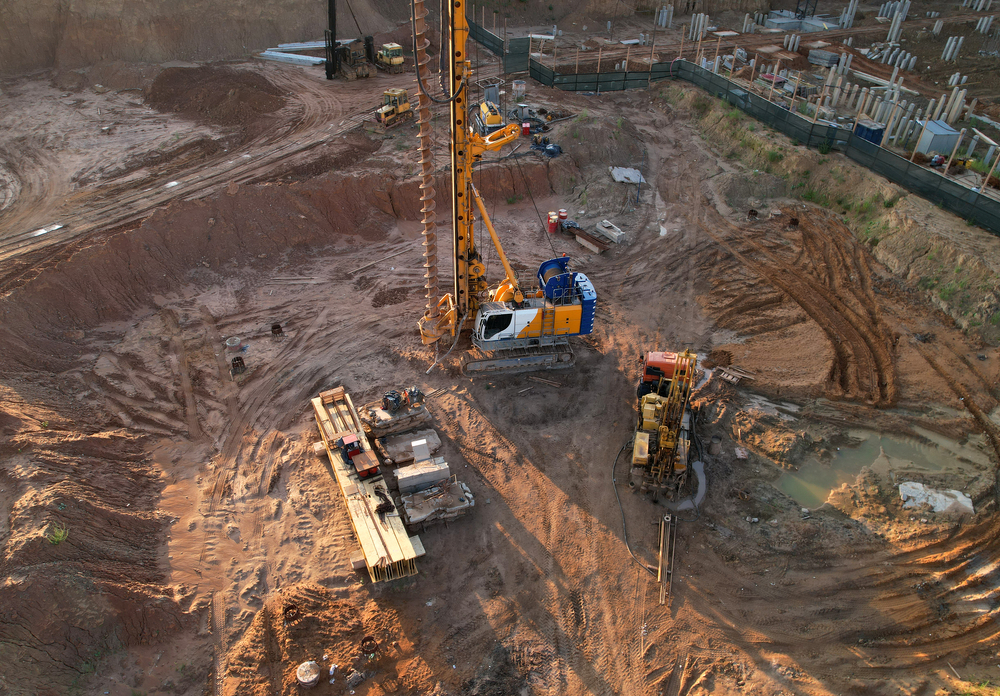Facts About Geotheta Revealed
Facts About Geotheta Revealed
Blog Article
An Unbiased View of Geotheta
Table of ContentsHow Geotheta can Save You Time, Stress, and Money.The smart Trick of Geotheta That Nobody is DiscussingThe 2-Minute Rule for GeothetaAn Unbiased View of Geotheta
They work together with civil engineers, structural designers, designers, and other professionals to incorporate geotechnical considerations into the total task style and building process. This needs efficient team effort, coordination, and communication to ensure that the geotechnical elements line up with the task purposes and meet regulatory demands.Mining & Products Design: Principles of drilling, penetration rates, and variables influencing the selection of exploration approach. Attributes of dynamites, firing systems and blast patterns. Blowing up strategies in surface area and below ground functions. Unique blasting techniques at excavation borders. Vibration and noise control. Mechanical and continuous approaches to fragmentation, consisting of longwall shearing and fullface boring.
Integrated evaluation of fragmentation and comminution operations. Provided by: Mining & Materials Design.
Little Known Questions About Geotheta.
Bachelor's level programs in civil, geotechnical, geological, and environmental design usually last 4 years and consist of basic education and learning training courses in English, social scientific research, and the liberal arts, as well as courses in sophisticated mathematics, architectural geology, and liquid mineralogy. (https://www.twitch.tv/geotheta/about)
Geotechnical design involves the analysis of the soil and rock problems at a particular website, and their effects for the advancement of that site. As the majority of structures count on the ground for assistance, it is without surprise that an in-depth understanding of the ground problems, and the suitability of structure systems, are important to the long-lasting security and efficiency of the structure or framework.
Being experts in the examination of geological formations and ground behavior, geotechnical engineers do clinical examinations and testing to comprehend the influence these geological developments might carry the design and building of structure, civil and framework jobs. This experience is crucial for the style and building of buildings, roadways, passages, dams, bridges, and water and sewage systems.
The geotechnical team at Douglas Allies consistently seek advice from with engineers, layout designers, designers, and builders to make recommendations on design and development proposals to ensure that the built structures are suitably created for the ground problems. For instance, the design of footing systems needs to take into consideration the weight of the framework, the capability of the ground to support that weight together with activity resistances and effective building.
Things about Geotheta
This task is significantly streamlined by the use our Douglas Map geospatial system which makes this information readily available in an easy to use web browser interface. A geotechnical engineer will certainly route the boring of boreholes and test pits to collect soil and other examples, and additionally assess surface functions and ground exposures to develop a geotechnical model of the subsurface problems.
Depending upon the project type and ground conditions experienced, laboratory testing may amongst other things assess stamina, compressibility, reactivity and/or permeability of dirt and rock samples. After this information is accumulated and looked at, the results are utilized for a geotechnical model of the website, which is typically presented as areas across the website.

A geotechnical examination by nature can just analyze the ground conditions at the locations pierced or dug deep into. All-natural variations in soil and rock conditions can happen throughout a website and in between examination areas. It is for that reason great method that the geotechnical designer be preserved throughout construction of the project to give on-site verification that the ground conditions run into follow the expectations and advice offered in the geotechnical investigation report.
Some Known Factual Statements About Geotheta
Geotechnical engineers utilize their extensive understanding of soil and rock to assess threat and address problems on diverse facilities projectsGeotechnical design is a specialist branch of civil design which considers the behaviour of earth products and the application of dirt view it and rock auto mechanics. Engineer of Record. As a geotechnical engineer, you will certainly examine the physical, mechanical and chemical homes of soil and rock in order to make foundations, keeping frameworks and earthworks
Geotechnical design is very closely linked to and overlaps with, both engineering geology and ground design - https://www.metal-archives.com/users/geotheta. It's possible to be experts in geotechnics or help a geotechnical company however be referred to as an engineering rock hound or a ground designer. As a geotechnical engineer, you'll require to: develop and maintain relationships with clients and various other professionals involved in the site, throughout each projectmaintain safety standards on website be conscious of expense implications when you make recommendationsstudy geological maps and airborne pictures from a range of resources and from various time periodsexamine building intends to see just how possible they are based upon your understanding of the siteinvestigate dangers or geological risks for the sitesearch for environmentally sensitive features, such as land fill begin to develop factual and expository ground modelsplan area investigationsdrill and analyse samples of bedrock, soil, groundwater and extra materials oversee other professionals on sitesolve technical issues as they develop, such as unexpected structures at drill sitesmonitor conditions during and after construction to ensure frameworks are stable in the brief and lengthy termadding data gathered on site to your first researchcreating geotechnical calculations, illustrations, and two or three-dimensional computer models analyzing the datamaking recommendations regarding the suggested usage of the site

Report this page